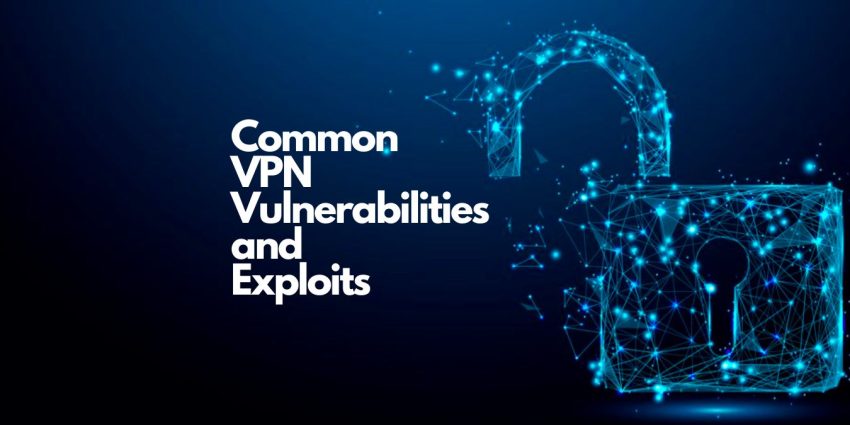Today’s digital landscape is filled with threats, data leaks, and more. It is no wonder privacy and security software have become necessary for our online activities, whether you’re on the Darknet or streaming something on Netflix. While security technology, like VPNs, has made huge leaps in its ability to protect us, there’s always that one incredibly talented person with skewed morals who is capable of breaking the encryption.
So, how do we avoid this? Well, getting to know the limits and vulnerabilities of your VPN is a good start. By understanding the vulnerabilities in a VPN, you can organize how you use it to limit the risk of being hit by a phishing attack or any other cyberattack used these days. Please continue reading below as we discuss some common VPN vulnerabilities and exploits.
See our list of the best anonymous VPNs out there.
What is a VPN?
Firstly, to understand VPN vulnerabilities, we need to understand how VPNs function. VPN stands for virtual private network. They offer a protected network connection while you’re browsing public networks.
VPNs allow users to browse the internet with a masked IP address by creating a private, encrypted tunnel to funnel their data through. This makes it difficult for sites to retain your information and hinders the tracking of your online activity and the location from which you have connected to the web.
Loads of great VPN providers provide excellent VPN services. A few to mention are ExpressVPN, CyberGhost, and NordVPN. However, there are many other great choices. VPN services offer several benefits to optimize your privacy on the internet. A few of them include:
- No-log policies
- Multiple server locations
- randomized IP address generation
- Multi-grade encryption
- Supported on multiple devices
While a VPN offers reasonable security, you must consider its vulnerabilities. Let’s take a look at the common vulnerabilities VPNs face.
Phishing Attacks Target VPN Users
Phishing attacks and other cyber attacks like social engineering are methods employed by cyber criminals to trick individuals into divulging their personal information, like login details, ID numbers, or even bank details. So, VPNs are supposed to help us avoid this. That’s true; however, what better way to trick someone into giving their personal information than by posing as a VPN service provider and relying on individuals’ trust for VPN services?
One tactic they use is creating a fake VPN service with a website or apps. These sites and apps look legitimate. As soon as you subscribe and share your data, you’re caught. But there is a way you can avoid getting caught by such tactics. Verified VPNs likely use an HTTP or HTTPS URL with an SSL certificate. Check the URLs in the search bar to see if they are secure site links. If not, then instead, look for another VPN.
Another method cybercriminals use is called spear phishing. With spear phishing attacks, you will receive emails from a reputable source, like a VPN provider. The email will usually link back to a fake website, as we mentioned above, leading you to provide personal information. Many VPNs will let you know if you’re being phished as they check the website domain as you enter it.
Man-in-the-middle Attacks
This is where things get scary. Man-in-the-middle attacks on VPN users are when hackers intercept and manipulate the traffic between you and your VPN server while stealing your data. The hacker is pretty much working as a middleman, thus the name. While keeping their involvement anonymous.
So how do they do this, and how do we stop it? Hackers use a few tactics to play the middleman. A well-known tactic is called Address Resolution Protocol (ARP) spoofing. The hacker will send an ARP message to your device in the hope that they can trick you into sending the “traffic” their way instead of back to the VPN server.
SSL/TLS encryption stripping is another method hackers use to weasel their way into the middle. The hacker removes the SSL/TLS encryption from your traffic, giving them free rein to access and modify your data before relaying it to the VPN server.
Choose a VPN with robust encryption protocols to prevent these kinds of attacks. VPNs also update their software regularly to optimize security. Keeping an eye out for these updates should help you stay one step ahead. Finally, certificate pinning and security measures like two-factor authentication are ways to give you that extra layer of defence.
WebRCT Leaks and DNS Leaks
A Web Real-Time Communication (WebRCT) and Domain Name System (DNS) leak are common vulnerabilities cyber criminals love to exploit. DNS leaks occur when your VPN service fails to correctly route the DNS request through an encrypted tunnel, which could reveal your IP address and location.
WebRCT leaks occur when the browser uses a WebRCT API to reveal your IP address and location while using a VPN. This gives the hacker ample opportunity to jump in and employ a man-in-the-middle tactic.
A few things often cause these leaks. Incorrectly configuring your VPN can open you up to these leaks. If your browser is set to WebRCT by default, it could also open you up. If you’re using a VPN connection that isn’t secure, you’re opening yourself up to this risk. To avoid these leaks, ensure your VPN is configured correctly, that WebRCT is off on your device, and that you use a secure, verified VPN provider.
VPN Client and Server Software Vulnerabilities
The relationship between VPN users and the server is established with a secure connection. VPN users usually connect multiple devices to the server where VPN server software is installed to manage these connections. There are a few vulnerabilities that hackers can exploit in this process.
The first one is remote code execution. With specific software systems, hackers can use a code on VPN users and server software remotely. This will give them full access to the system, allowing them to steal as much information as they want.
Another vulnerability is unpatched software. If your VPN software isn’t updated regularly, you are at risk. Hackers develop methods to overcome security software all the time. To stay ahead of the competition, VPNs upgrade their security protocols. Hackers might gain access to your system if you don’t update them.
Lastly, if you are still using default credentials, you are vulnerable. Specific VPNs use default credentials and encourage users to update them when subscribing. However, not everyone does. Over time, these default credentials become easier to figure out, giving hackers a one-way ticket to your personal information. To limit these vulnerabilities, keep your software up to date, change your passwords, and make them unique.
Data Leaks and Security Breaches
Data leaks and security breaches have given many people a wake-up call when using third-party VPN providers. These kinds of leaks or breaches occur when a hacker or malicious party manages to access a VPN database. There are a few ways they can do this. Weak passwords, unsecured servers, and lousy network infrastructure could provide them a pathway.
Once they’re in, hackers can access sensitive data, modify traffic, and intercept it. To combat these vulnerabilities, try to use a strong password always. Choosing a VPN provider with no logs is another efficient method. This means your VPN provider doesn’t keep your data on their servers.
How to Choose the Right VPN
Choosing the right VPN can save you a lot of time to eliminate these vulnerabilities. From the get-go, look for a VPN that has the following features:
- Strong encryption protocols
- No-logs
- Leak protection
- Reputable track record
- Valid and secure website
- Multiple server locations
- Customer help service
- Paid features
Along with these features, it’s also best to research before choosing a VPN. Check reputable sources that review VPNs. You should find the best VPNs in these lists.
Frequently Asked Questions
Unfortunately not. While VPNs offer excellent security features, there is always the chance they could be hacked, even if it’s small. To boost their security, VPN users must practice online safety measures like strong passwords and MFA (multi-factor authentication).
No, not all VPNs off the same level of security. Specific VPNs have more robust security protocols, making them more challenging to hack. These are usually paid VPNs that have the backing to provide more robust services.
Public Wi-Fi networks are generally considered to be an easier target for hackers. That said, using a VPN on public Wi-Fi should significantly boost your security. A good VPN shouldn’t be vulnerable due to public Wi-fi.

